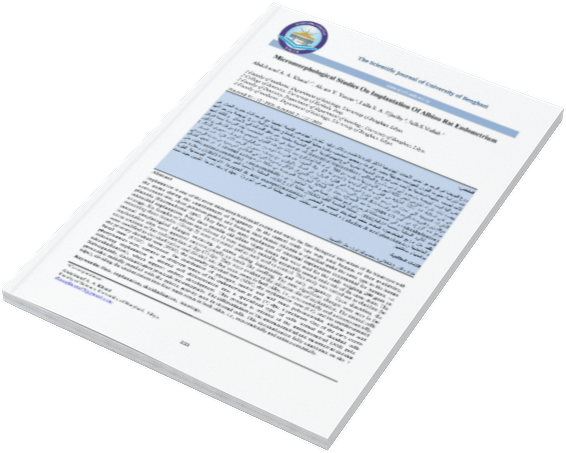Micromorphological Studies On Implantation Of Albino Rat Endometrium
DOI:
https://doi.org/10.37376/sjuob.v33i2.257Keywords:
histology, decidualization, implantation, RatsAbstract
Implantation is one of the most interesting biological events and marks the first biological interaction of the blastocyst with the uterus during the establishment of pregnancy. In the current study rats were used because of their availability, convenient size, short gestation period, and because their mature placenta is classified under the same type as the human placenta (Haemochorial type). They have the same mechanism of placental implantation documented for humans, i.e. interstitial implantation. Nine three months old albino virgin female rats were used for the study weighing 200 gram on average. Six females of albino rats (Group 1) were naturally mated by apparently normal male rats of the same strain. The remaining three females (Group 2) were not mated and as such used as control. This study was carried out to elucidate the normal morphological changes occurring in uterus during implantation and early pregnancy. Upon dissection, the implantation sites were apparent macroscopically as beads like swelling. The most significant changes were seen in the cross sections of the endometrium at day (7) dpc. They were evident at the initiation site of implantation. The stromal cells were modified to decidualization and divided into four main zones in both sides, i.e., mesometrially and antimesometrially; the primary decidual zone (PDZ), the secondry decidual zone (SDZ), the implantation zone (I.Z), and the undifferentiated basal zone (UBZ). Moreover, the distribution of glycogen, neutral and acid muco polysaccarides, alkaline and acid phosphatases were variable in different zones of the endometrium at day (7) dpc. Conclusion: One of the early events following implantation is stromal cell differentiation into a specialized type of cells termed the decidual cells (decidualization), which support embryo development. This process is initiated at the antimesometrial (AM) pole. Subsequently, decidualization proceeds mesometrially. The differentiation of the antimesometrial and mesometrial decidua proceeded radially parallel with the mitotic activity seen in stromal cells. This decidualization fully established on day 7 (dpc), dividing the endometrium into four main zones in both sides, i.e., mesometrially and antimesometrially.
Downloads

Downloads
Published
How to Cite
Issue
Section
License

This work is licensed under a Creative Commons Attribution-NonCommercial-NoDerivatives 4.0 International License.


















